Analysis of Customer Relationship Management in Hospitality
VerifiedAdded on 2022/09/27
|10
|3678
|46
Report
AI Summary
This report delves into the significance of Customer Relationship Management (CRM) within the thriving hospitality industry, emphasizing its role in enhancing customer experiences and driving operational efficiency. It explores how technology, particularly CRM, has revolutionized the hotel sector by optimizing costs, improving services, and fostering stronger customer connections. The report examines various dimensions of CRM, including customer orientation, organizational structures, knowledge management, and technology integration, highlighting their collective impact on hotel performance and marketing capabilities. It also discusses the influence of marketing planning and implementation competencies on organizational success, alongside the importance of customer-centric strategies in building loyalty and gaining a competitive edge. The analysis underscores the critical role of CRM in adapting to evolving customer expectations, price sensitivity, and the increasing need for personalized services, ultimately contributing to increased profitability and long-term guest retention. The report concludes by emphasizing the necessity of integrating CRM effectively to achieve organizational goals and enhance customer relationships.
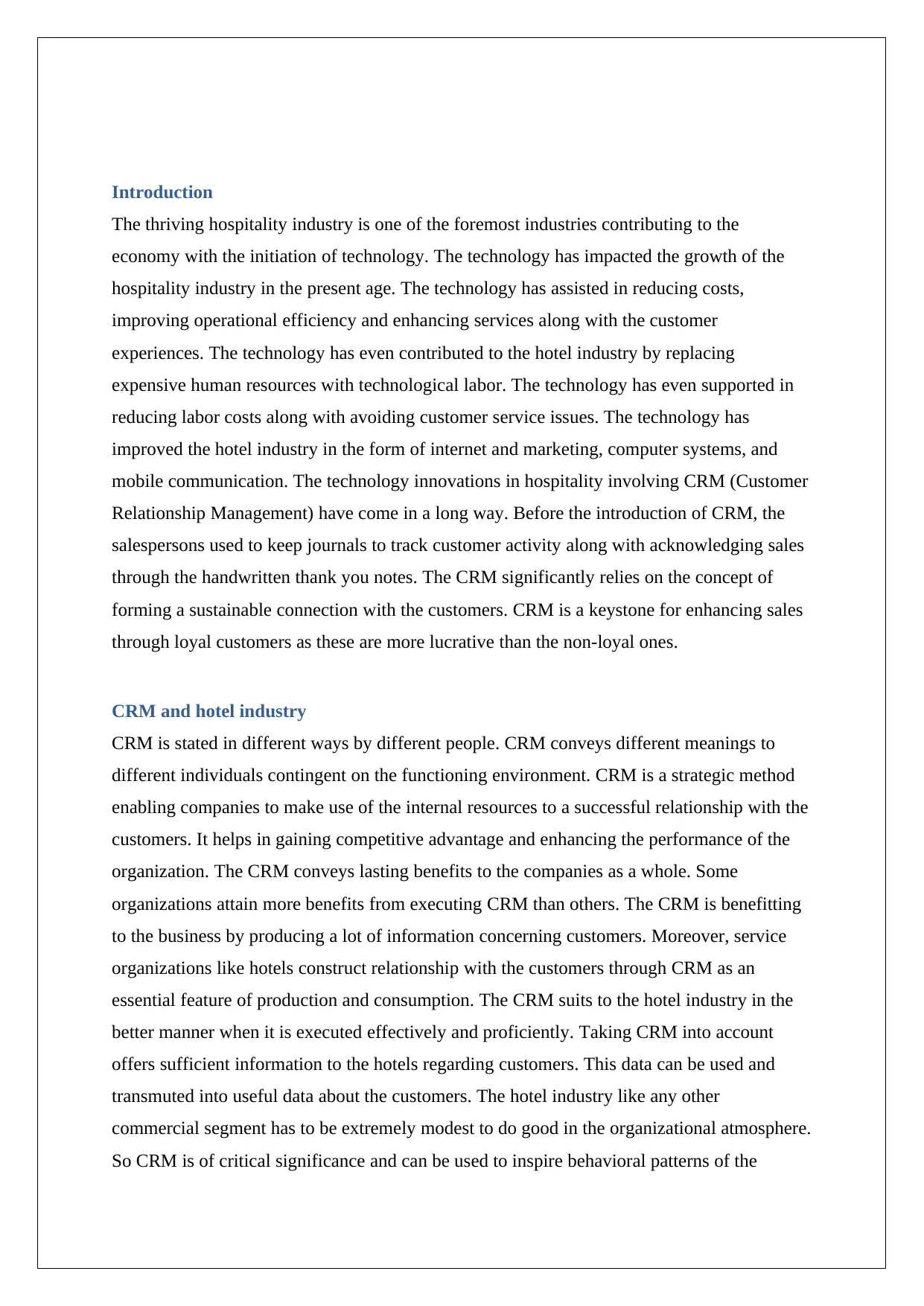
Introduction
The thriving hospitality industry is one of the foremost industries contributing to the
economy with the initiation of technology. The technology has impacted the growth of the
hospitality industry in the present age. The technology has assisted in reducing costs,
improving operational efficiency and enhancing services along with the customer
experiences. The technology has even contributed to the hotel industry by replacing
expensive human resources with technological labor. The technology has even supported in
reducing labor costs along with avoiding customer service issues. The technology has
improved the hotel industry in the form of internet and marketing, computer systems, and
mobile communication. The technology innovations in hospitality involving CRM (Customer
Relationship Management) have come in a long way. Before the introduction of CRM, the
salespersons used to keep journals to track customer activity along with acknowledging sales
through the handwritten thank you notes. The CRM significantly relies on the concept of
forming a sustainable connection with the customers. CRM is a keystone for enhancing sales
through loyal customers as these are more lucrative than the non-loyal ones.
CRM and hotel industry
CRM is stated in different ways by different people. CRM conveys different meanings to
different individuals contingent on the functioning environment. CRM is a strategic method
enabling companies to make use of the internal resources to a successful relationship with the
customers. It helps in gaining competitive advantage and enhancing the performance of the
organization. The CRM conveys lasting benefits to the companies as a whole. Some
organizations attain more benefits from executing CRM than others. The CRM is benefitting
to the business by producing a lot of information concerning customers. Moreover, service
organizations like hotels construct relationship with the customers through CRM as an
essential feature of production and consumption. The CRM suits to the hotel industry in the
better manner when it is executed effectively and proficiently. Taking CRM into account
offers sufficient information to the hotels regarding customers. This data can be used and
transmuted into useful data about the customers. The hotel industry like any other
commercial segment has to be extremely modest to do good in the organizational atmosphere.
So CRM is of critical significance and can be used to inspire behavioral patterns of the
The thriving hospitality industry is one of the foremost industries contributing to the
economy with the initiation of technology. The technology has impacted the growth of the
hospitality industry in the present age. The technology has assisted in reducing costs,
improving operational efficiency and enhancing services along with the customer
experiences. The technology has even contributed to the hotel industry by replacing
expensive human resources with technological labor. The technology has even supported in
reducing labor costs along with avoiding customer service issues. The technology has
improved the hotel industry in the form of internet and marketing, computer systems, and
mobile communication. The technology innovations in hospitality involving CRM (Customer
Relationship Management) have come in a long way. Before the introduction of CRM, the
salespersons used to keep journals to track customer activity along with acknowledging sales
through the handwritten thank you notes. The CRM significantly relies on the concept of
forming a sustainable connection with the customers. CRM is a keystone for enhancing sales
through loyal customers as these are more lucrative than the non-loyal ones.
CRM and hotel industry
CRM is stated in different ways by different people. CRM conveys different meanings to
different individuals contingent on the functioning environment. CRM is a strategic method
enabling companies to make use of the internal resources to a successful relationship with the
customers. It helps in gaining competitive advantage and enhancing the performance of the
organization. The CRM conveys lasting benefits to the companies as a whole. Some
organizations attain more benefits from executing CRM than others. The CRM is benefitting
to the business by producing a lot of information concerning customers. Moreover, service
organizations like hotels construct relationship with the customers through CRM as an
essential feature of production and consumption. The CRM suits to the hotel industry in the
better manner when it is executed effectively and proficiently. Taking CRM into account
offers sufficient information to the hotels regarding customers. This data can be used and
transmuted into useful data about the customers. The hotel industry like any other
commercial segment has to be extremely modest to do good in the organizational atmosphere.
So CRM is of critical significance and can be used to inspire behavioral patterns of the
Paraphrase This Document
Need a fresh take? Get an instant paraphrase of this document with our AI Paraphraser
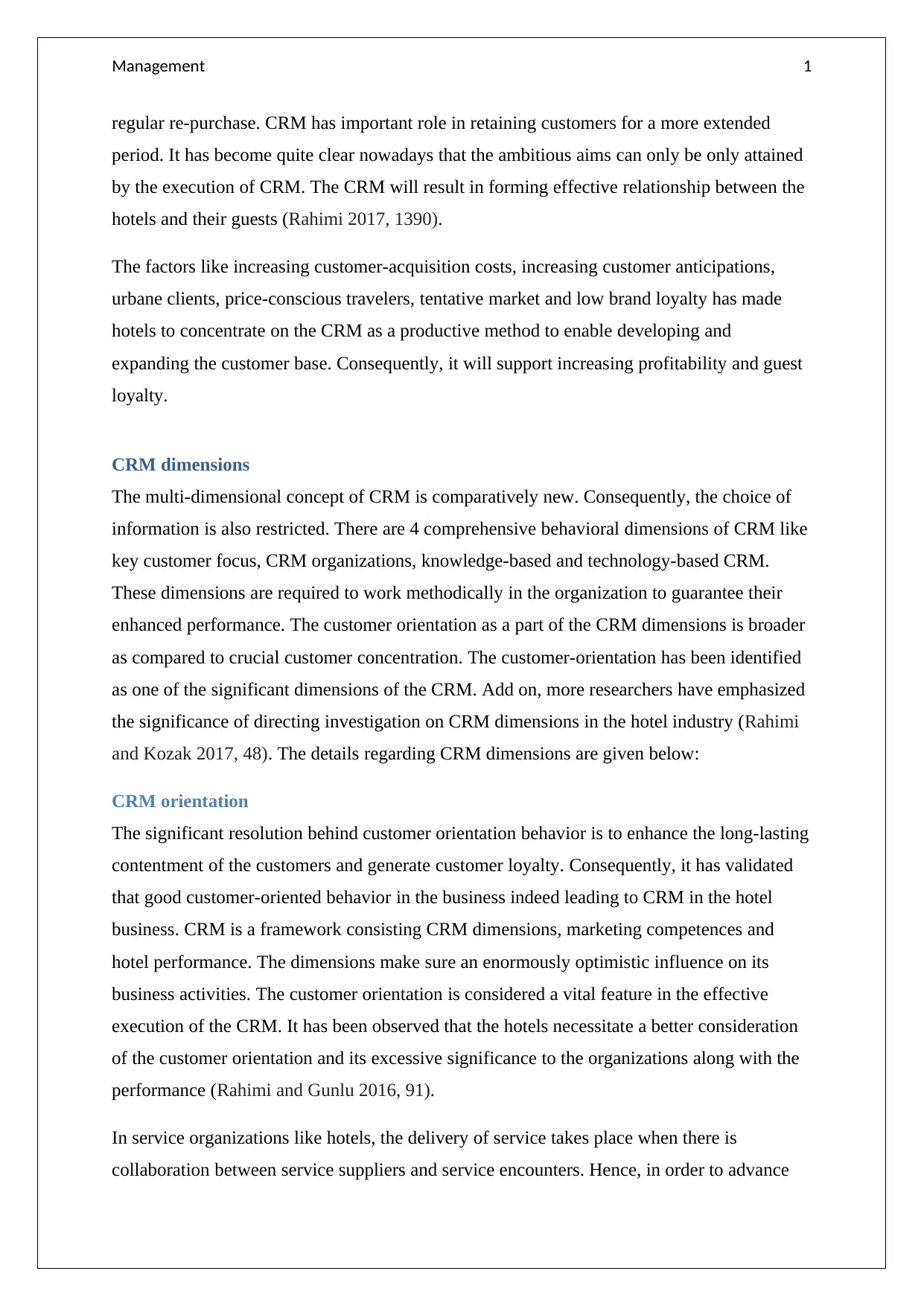
Management 1
regular re-purchase. CRM has important role in retaining customers for a more extended
period. It has become quite clear nowadays that the ambitious aims can only be only attained
by the execution of CRM. The CRM will result in forming effective relationship between the
hotels and their guests (Rahimi 2017, 1390).
The factors like increasing customer-acquisition costs, increasing customer anticipations,
urbane clients, price-conscious travelers, tentative market and low brand loyalty has made
hotels to concentrate on the CRM as a productive method to enable developing and
expanding the customer base. Consequently, it will support increasing profitability and guest
loyalty.
CRM dimensions
The multi-dimensional concept of CRM is comparatively new. Consequently, the choice of
information is also restricted. There are 4 comprehensive behavioral dimensions of CRM like
key customer focus, CRM organizations, knowledge-based and technology-based CRM.
These dimensions are required to work methodically in the organization to guarantee their
enhanced performance. The customer orientation as a part of the CRM dimensions is broader
as compared to crucial customer concentration. The customer-orientation has been identified
as one of the significant dimensions of the CRM. Add on, more researchers have emphasized
the significance of directing investigation on CRM dimensions in the hotel industry (Rahimi
and Kozak 2017, 48). The details regarding CRM dimensions are given below:
CRM orientation
The significant resolution behind customer orientation behavior is to enhance the long-lasting
contentment of the customers and generate customer loyalty. Consequently, it has validated
that good customer-oriented behavior in the business indeed leading to CRM in the hotel
business. CRM is a framework consisting CRM dimensions, marketing competences and
hotel performance. The dimensions make sure an enormously optimistic influence on its
business activities. The customer orientation is considered a vital feature in the effective
execution of the CRM. It has been observed that the hotels necessitate a better consideration
of the customer orientation and its excessive significance to the organizations along with the
performance (Rahimi and Gunlu 2016, 91).
In service organizations like hotels, the delivery of service takes place when there is
collaboration between service suppliers and service encounters. Hence, in order to advance
regular re-purchase. CRM has important role in retaining customers for a more extended
period. It has become quite clear nowadays that the ambitious aims can only be only attained
by the execution of CRM. The CRM will result in forming effective relationship between the
hotels and their guests (Rahimi 2017, 1390).
The factors like increasing customer-acquisition costs, increasing customer anticipations,
urbane clients, price-conscious travelers, tentative market and low brand loyalty has made
hotels to concentrate on the CRM as a productive method to enable developing and
expanding the customer base. Consequently, it will support increasing profitability and guest
loyalty.
CRM dimensions
The multi-dimensional concept of CRM is comparatively new. Consequently, the choice of
information is also restricted. There are 4 comprehensive behavioral dimensions of CRM like
key customer focus, CRM organizations, knowledge-based and technology-based CRM.
These dimensions are required to work methodically in the organization to guarantee their
enhanced performance. The customer orientation as a part of the CRM dimensions is broader
as compared to crucial customer concentration. The customer-orientation has been identified
as one of the significant dimensions of the CRM. Add on, more researchers have emphasized
the significance of directing investigation on CRM dimensions in the hotel industry (Rahimi
and Kozak 2017, 48). The details regarding CRM dimensions are given below:
CRM orientation
The significant resolution behind customer orientation behavior is to enhance the long-lasting
contentment of the customers and generate customer loyalty. Consequently, it has validated
that good customer-oriented behavior in the business indeed leading to CRM in the hotel
business. CRM is a framework consisting CRM dimensions, marketing competences and
hotel performance. The dimensions make sure an enormously optimistic influence on its
business activities. The customer orientation is considered a vital feature in the effective
execution of the CRM. It has been observed that the hotels necessitate a better consideration
of the customer orientation and its excessive significance to the organizations along with the
performance (Rahimi and Gunlu 2016, 91).
In service organizations like hotels, the delivery of service takes place when there is
collaboration between service suppliers and service encounters. Hence, in order to advance
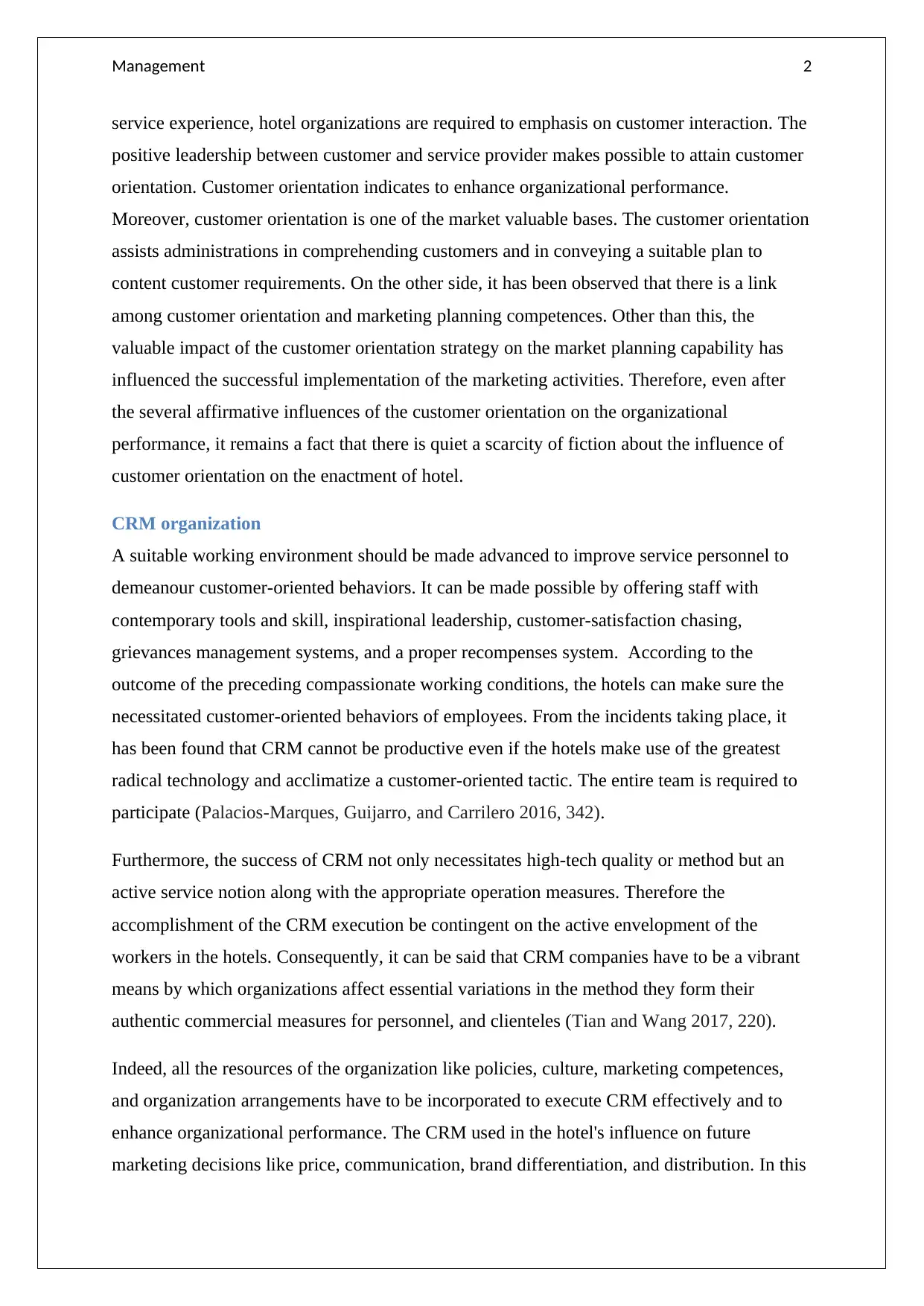
Management 2
service experience, hotel organizations are required to emphasis on customer interaction. The
positive leadership between customer and service provider makes possible to attain customer
orientation. Customer orientation indicates to enhance organizational performance.
Moreover, customer orientation is one of the market valuable bases. The customer orientation
assists administrations in comprehending customers and in conveying a suitable plan to
content customer requirements. On the other side, it has been observed that there is a link
among customer orientation and marketing planning competences. Other than this, the
valuable impact of the customer orientation strategy on the market planning capability has
influenced the successful implementation of the marketing activities. Therefore, even after
the several affirmative influences of the customer orientation on the organizational
performance, it remains a fact that there is quiet a scarcity of fiction about the influence of
customer orientation on the enactment of hotel.
CRM organization
A suitable working environment should be made advanced to improve service personnel to
demeanour customer-oriented behaviors. It can be made possible by offering staff with
contemporary tools and skill, inspirational leadership, customer-satisfaction chasing,
grievances management systems, and a proper recompenses system. According to the
outcome of the preceding compassionate working conditions, the hotels can make sure the
necessitated customer-oriented behaviors of employees. From the incidents taking place, it
has been found that CRM cannot be productive even if the hotels make use of the greatest
radical technology and acclimatize a customer-oriented tactic. The entire team is required to
participate (Palacios-Marques, Guijarro, and Carrilero 2016, 342).
Furthermore, the success of CRM not only necessitates high-tech quality or method but an
active service notion along with the appropriate operation measures. Therefore the
accomplishment of the CRM execution be contingent on the active envelopment of the
workers in the hotels. Consequently, it can be said that CRM companies have to be a vibrant
means by which organizations affect essential variations in the method they form their
authentic commercial measures for personnel, and clienteles (Tian and Wang 2017, 220).
Indeed, all the resources of the organization like policies, culture, marketing competences,
and organization arrangements have to be incorporated to execute CRM effectively and to
enhance organizational performance. The CRM used in the hotel's influence on future
marketing decisions like price, communication, brand differentiation, and distribution. In this
service experience, hotel organizations are required to emphasis on customer interaction. The
positive leadership between customer and service provider makes possible to attain customer
orientation. Customer orientation indicates to enhance organizational performance.
Moreover, customer orientation is one of the market valuable bases. The customer orientation
assists administrations in comprehending customers and in conveying a suitable plan to
content customer requirements. On the other side, it has been observed that there is a link
among customer orientation and marketing planning competences. Other than this, the
valuable impact of the customer orientation strategy on the market planning capability has
influenced the successful implementation of the marketing activities. Therefore, even after
the several affirmative influences of the customer orientation on the organizational
performance, it remains a fact that there is quiet a scarcity of fiction about the influence of
customer orientation on the enactment of hotel.
CRM organization
A suitable working environment should be made advanced to improve service personnel to
demeanour customer-oriented behaviors. It can be made possible by offering staff with
contemporary tools and skill, inspirational leadership, customer-satisfaction chasing,
grievances management systems, and a proper recompenses system. According to the
outcome of the preceding compassionate working conditions, the hotels can make sure the
necessitated customer-oriented behaviors of employees. From the incidents taking place, it
has been found that CRM cannot be productive even if the hotels make use of the greatest
radical technology and acclimatize a customer-oriented tactic. The entire team is required to
participate (Palacios-Marques, Guijarro, and Carrilero 2016, 342).
Furthermore, the success of CRM not only necessitates high-tech quality or method but an
active service notion along with the appropriate operation measures. Therefore the
accomplishment of the CRM execution be contingent on the active envelopment of the
workers in the hotels. Consequently, it can be said that CRM companies have to be a vibrant
means by which organizations affect essential variations in the method they form their
authentic commercial measures for personnel, and clienteles (Tian and Wang 2017, 220).
Indeed, all the resources of the organization like policies, culture, marketing competences,
and organization arrangements have to be incorporated to execute CRM effectively and to
enhance organizational performance. The CRM used in the hotel's influence on future
marketing decisions like price, communication, brand differentiation, and distribution. In this
⊘ This is a preview!⊘
Do you want full access?
Subscribe today to unlock all pages.

Trusted by 1+ million students worldwide
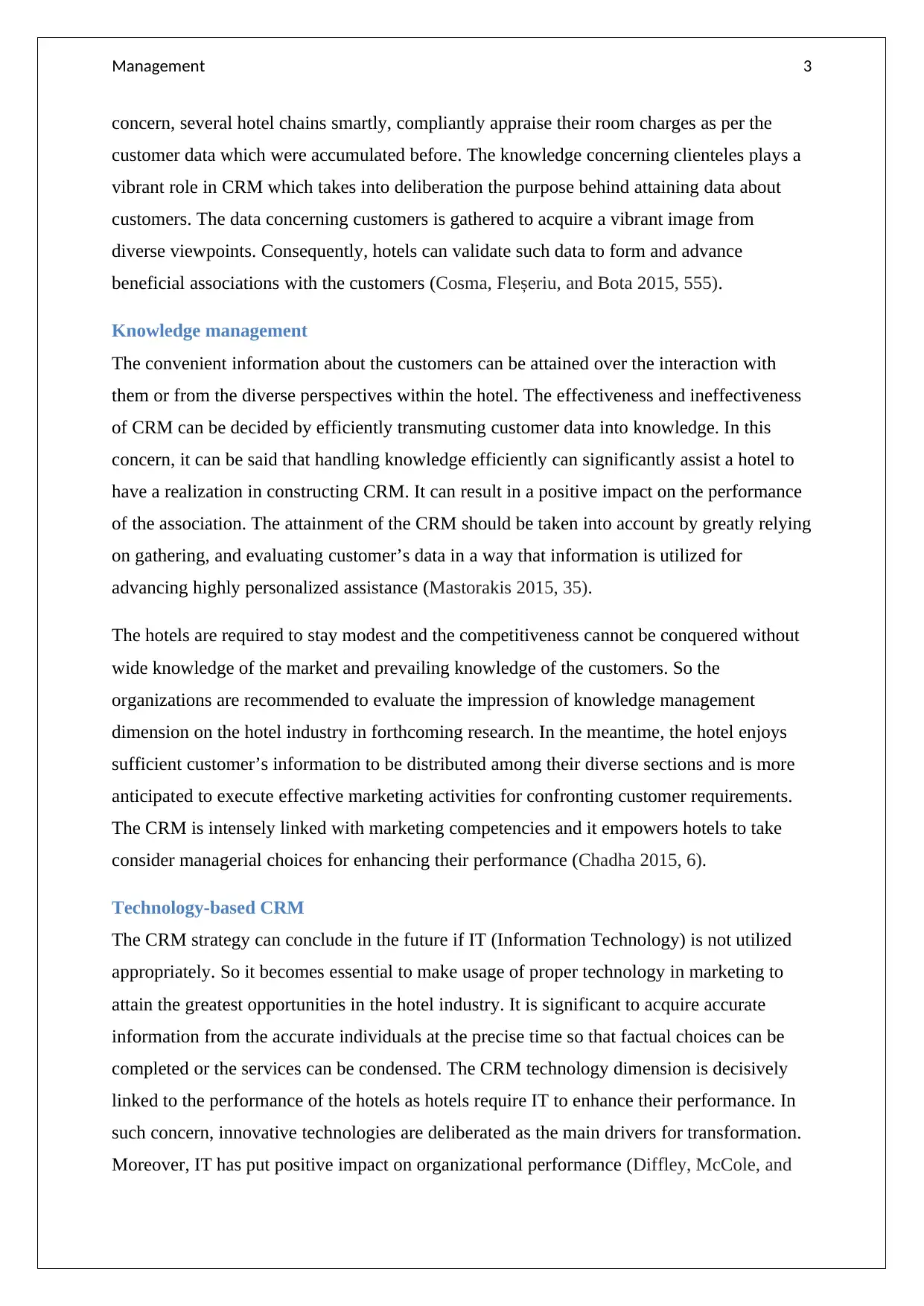
Management 3
concern, several hotel chains smartly, compliantly appraise their room charges as per the
customer data which were accumulated before. The knowledge concerning clienteles plays a
vibrant role in CRM which takes into deliberation the purpose behind attaining data about
customers. The data concerning customers is gathered to acquire a vibrant image from
diverse viewpoints. Consequently, hotels can validate such data to form and advance
beneficial associations with the customers (Cosma, Fleșeriu, and Bota 2015, 555).
Knowledge management
The convenient information about the customers can be attained over the interaction with
them or from the diverse perspectives within the hotel. The effectiveness and ineffectiveness
of CRM can be decided by efficiently transmuting customer data into knowledge. In this
concern, it can be said that handling knowledge efficiently can significantly assist a hotel to
have a realization in constructing CRM. It can result in a positive impact on the performance
of the association. The attainment of the CRM should be taken into account by greatly relying
on gathering, and evaluating customer’s data in a way that information is utilized for
advancing highly personalized assistance (Mastorakis 2015, 35).
The hotels are required to stay modest and the competitiveness cannot be conquered without
wide knowledge of the market and prevailing knowledge of the customers. So the
organizations are recommended to evaluate the impression of knowledge management
dimension on the hotel industry in forthcoming research. In the meantime, the hotel enjoys
sufficient customer’s information to be distributed among their diverse sections and is more
anticipated to execute effective marketing activities for confronting customer requirements.
The CRM is intensely linked with marketing competencies and it empowers hotels to take
consider managerial choices for enhancing their performance (Chadha 2015, 6).
Technology-based CRM
The CRM strategy can conclude in the future if IT (Information Technology) is not utilized
appropriately. So it becomes essential to make usage of proper technology in marketing to
attain the greatest opportunities in the hotel industry. It is significant to acquire accurate
information from the accurate individuals at the precise time so that factual choices can be
completed or the services can be condensed. The CRM technology dimension is decisively
linked to the performance of the hotels as hotels require IT to enhance their performance. In
such concern, innovative technologies are deliberated as the main drivers for transformation.
Moreover, IT has put positive impact on organizational performance (Diffley, McCole, and
concern, several hotel chains smartly, compliantly appraise their room charges as per the
customer data which were accumulated before. The knowledge concerning clienteles plays a
vibrant role in CRM which takes into deliberation the purpose behind attaining data about
customers. The data concerning customers is gathered to acquire a vibrant image from
diverse viewpoints. Consequently, hotels can validate such data to form and advance
beneficial associations with the customers (Cosma, Fleșeriu, and Bota 2015, 555).
Knowledge management
The convenient information about the customers can be attained over the interaction with
them or from the diverse perspectives within the hotel. The effectiveness and ineffectiveness
of CRM can be decided by efficiently transmuting customer data into knowledge. In this
concern, it can be said that handling knowledge efficiently can significantly assist a hotel to
have a realization in constructing CRM. It can result in a positive impact on the performance
of the association. The attainment of the CRM should be taken into account by greatly relying
on gathering, and evaluating customer’s data in a way that information is utilized for
advancing highly personalized assistance (Mastorakis 2015, 35).
The hotels are required to stay modest and the competitiveness cannot be conquered without
wide knowledge of the market and prevailing knowledge of the customers. So the
organizations are recommended to evaluate the impression of knowledge management
dimension on the hotel industry in forthcoming research. In the meantime, the hotel enjoys
sufficient customer’s information to be distributed among their diverse sections and is more
anticipated to execute effective marketing activities for confronting customer requirements.
The CRM is intensely linked with marketing competencies and it empowers hotels to take
consider managerial choices for enhancing their performance (Chadha 2015, 6).
Technology-based CRM
The CRM strategy can conclude in the future if IT (Information Technology) is not utilized
appropriately. So it becomes essential to make usage of proper technology in marketing to
attain the greatest opportunities in the hotel industry. It is significant to acquire accurate
information from the accurate individuals at the precise time so that factual choices can be
completed or the services can be condensed. The CRM technology dimension is decisively
linked to the performance of the hotels as hotels require IT to enhance their performance. In
such concern, innovative technologies are deliberated as the main drivers for transformation.
Moreover, IT has put positive impact on organizational performance (Diffley, McCole, and
Paraphrase This Document
Need a fresh take? Get an instant paraphrase of this document with our AI Paraphraser
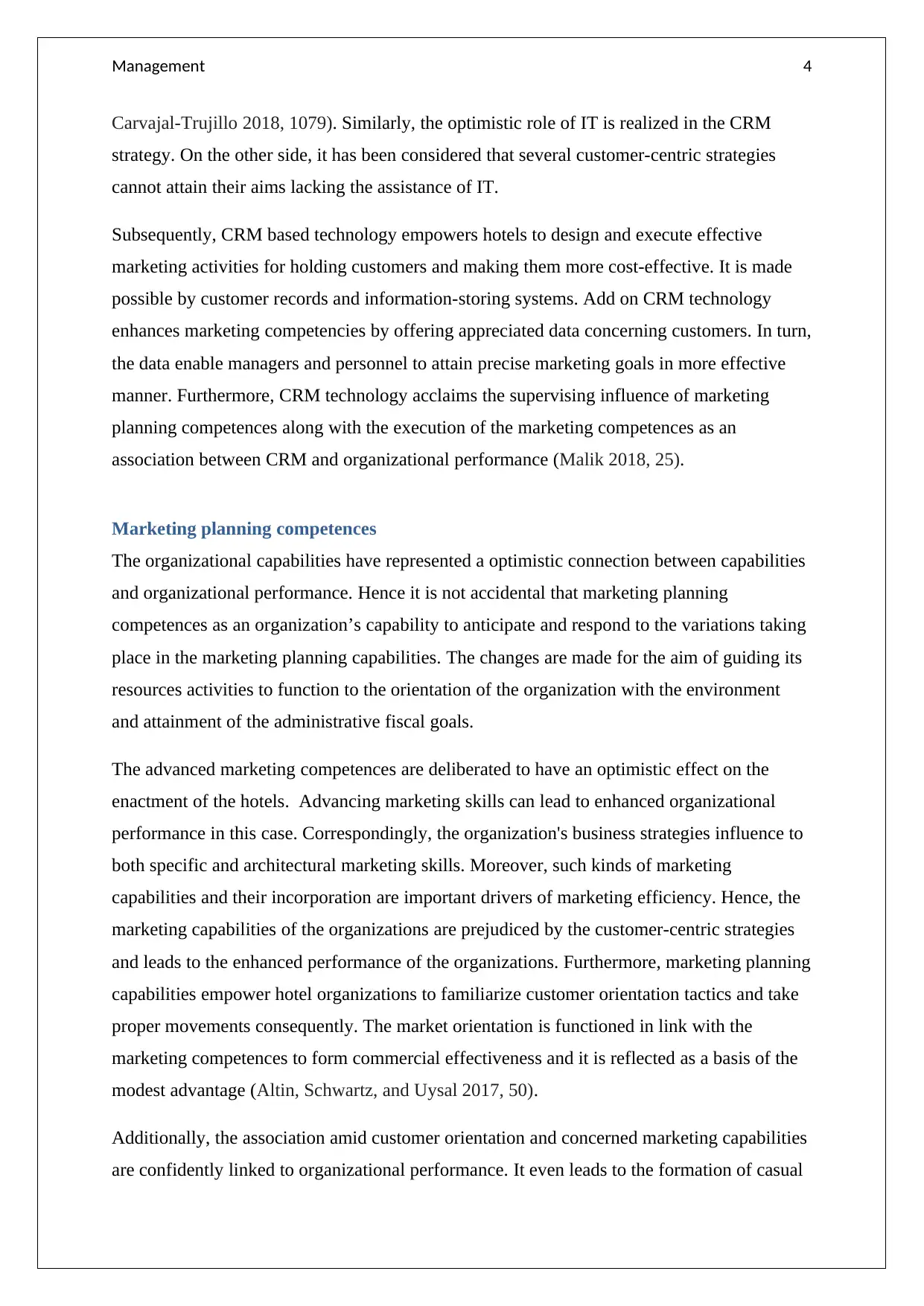
Management 4
Carvajal-Trujillo 2018, 1079). Similarly, the optimistic role of IT is realized in the CRM
strategy. On the other side, it has been considered that several customer-centric strategies
cannot attain their aims lacking the assistance of IT.
Subsequently, CRM based technology empowers hotels to design and execute effective
marketing activities for holding customers and making them more cost-effective. It is made
possible by customer records and information-storing systems. Add on CRM technology
enhances marketing competencies by offering appreciated data concerning customers. In turn,
the data enable managers and personnel to attain precise marketing goals in more effective
manner. Furthermore, CRM technology acclaims the supervising influence of marketing
planning competences along with the execution of the marketing competences as an
association between CRM and organizational performance (Malik 2018, 25).
Marketing planning competences
The organizational capabilities have represented a optimistic connection between capabilities
and organizational performance. Hence it is not accidental that marketing planning
competences as an organization’s capability to anticipate and respond to the variations taking
place in the marketing planning capabilities. The changes are made for the aim of guiding its
resources activities to function to the orientation of the organization with the environment
and attainment of the administrative fiscal goals.
The advanced marketing competences are deliberated to have an optimistic effect on the
enactment of the hotels. Advancing marketing skills can lead to enhanced organizational
performance in this case. Correspondingly, the organization's business strategies influence to
both specific and architectural marketing skills. Moreover, such kinds of marketing
capabilities and their incorporation are important drivers of marketing efficiency. Hence, the
marketing capabilities of the organizations are prejudiced by the customer-centric strategies
and leads to the enhanced performance of the organizations. Furthermore, marketing planning
capabilities empower hotel organizations to familiarize customer orientation tactics and take
proper movements consequently. The market orientation is functioned in link with the
marketing competences to form commercial effectiveness and it is reflected as a basis of the
modest advantage (Altin, Schwartz, and Uysal 2017, 50).
Additionally, the association amid customer orientation and concerned marketing capabilities
are confidently linked to organizational performance. It even leads to the formation of casual
Carvajal-Trujillo 2018, 1079). Similarly, the optimistic role of IT is realized in the CRM
strategy. On the other side, it has been considered that several customer-centric strategies
cannot attain their aims lacking the assistance of IT.
Subsequently, CRM based technology empowers hotels to design and execute effective
marketing activities for holding customers and making them more cost-effective. It is made
possible by customer records and information-storing systems. Add on CRM technology
enhances marketing competencies by offering appreciated data concerning customers. In turn,
the data enable managers and personnel to attain precise marketing goals in more effective
manner. Furthermore, CRM technology acclaims the supervising influence of marketing
planning competences along with the execution of the marketing competences as an
association between CRM and organizational performance (Malik 2018, 25).
Marketing planning competences
The organizational capabilities have represented a optimistic connection between capabilities
and organizational performance. Hence it is not accidental that marketing planning
competences as an organization’s capability to anticipate and respond to the variations taking
place in the marketing planning capabilities. The changes are made for the aim of guiding its
resources activities to function to the orientation of the organization with the environment
and attainment of the administrative fiscal goals.
The advanced marketing competences are deliberated to have an optimistic effect on the
enactment of the hotels. Advancing marketing skills can lead to enhanced organizational
performance in this case. Correspondingly, the organization's business strategies influence to
both specific and architectural marketing skills. Moreover, such kinds of marketing
capabilities and their incorporation are important drivers of marketing efficiency. Hence, the
marketing capabilities of the organizations are prejudiced by the customer-centric strategies
and leads to the enhanced performance of the organizations. Furthermore, marketing planning
capabilities empower hotel organizations to familiarize customer orientation tactics and take
proper movements consequently. The market orientation is functioned in link with the
marketing competences to form commercial effectiveness and it is reflected as a basis of the
modest advantage (Altin, Schwartz, and Uysal 2017, 50).
Additionally, the association amid customer orientation and concerned marketing capabilities
are confidently linked to organizational performance. It even leads to the formation of casual
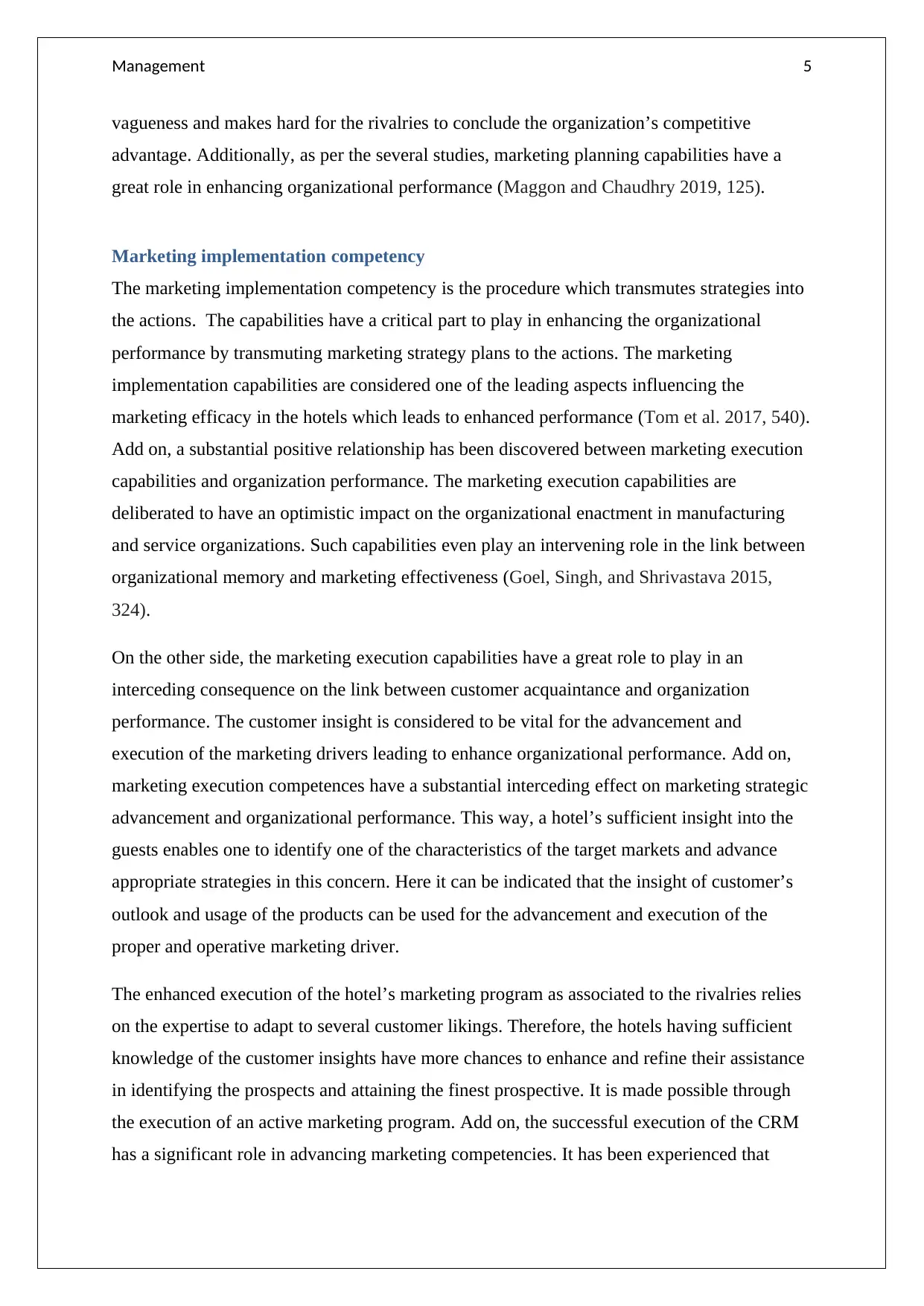
Management 5
vagueness and makes hard for the rivalries to conclude the organization’s competitive
advantage. Additionally, as per the several studies, marketing planning capabilities have a
great role in enhancing organizational performance (Maggon and Chaudhry 2019, 125).
Marketing implementation competency
The marketing implementation competency is the procedure which transmutes strategies into
the actions. The capabilities have a critical part to play in enhancing the organizational
performance by transmuting marketing strategy plans to the actions. The marketing
implementation capabilities are considered one of the leading aspects influencing the
marketing efficacy in the hotels which leads to enhanced performance (Tom et al. 2017, 540).
Add on, a substantial positive relationship has been discovered between marketing execution
capabilities and organization performance. The marketing execution capabilities are
deliberated to have an optimistic impact on the organizational enactment in manufacturing
and service organizations. Such capabilities even play an intervening role in the link between
organizational memory and marketing effectiveness (Goel, Singh, and Shrivastava 2015,
324).
On the other side, the marketing execution capabilities have a great role to play in an
interceding consequence on the link between customer acquaintance and organization
performance. The customer insight is considered to be vital for the advancement and
execution of the marketing drivers leading to enhance organizational performance. Add on,
marketing execution competences have a substantial interceding effect on marketing strategic
advancement and organizational performance. This way, a hotel’s sufficient insight into the
guests enables one to identify one of the characteristics of the target markets and advance
appropriate strategies in this concern. Here it can be indicated that the insight of customer’s
outlook and usage of the products can be used for the advancement and execution of the
proper and operative marketing driver.
The enhanced execution of the hotel’s marketing program as associated to the rivalries relies
on the expertise to adapt to several customer likings. Therefore, the hotels having sufficient
knowledge of the customer insights have more chances to enhance and refine their assistance
in identifying the prospects and attaining the finest prospective. It is made possible through
the execution of an active marketing program. Add on, the successful execution of the CRM
has a significant role in advancing marketing competencies. It has been experienced that
vagueness and makes hard for the rivalries to conclude the organization’s competitive
advantage. Additionally, as per the several studies, marketing planning capabilities have a
great role in enhancing organizational performance (Maggon and Chaudhry 2019, 125).
Marketing implementation competency
The marketing implementation competency is the procedure which transmutes strategies into
the actions. The capabilities have a critical part to play in enhancing the organizational
performance by transmuting marketing strategy plans to the actions. The marketing
implementation capabilities are considered one of the leading aspects influencing the
marketing efficacy in the hotels which leads to enhanced performance (Tom et al. 2017, 540).
Add on, a substantial positive relationship has been discovered between marketing execution
capabilities and organization performance. The marketing execution capabilities are
deliberated to have an optimistic impact on the organizational enactment in manufacturing
and service organizations. Such capabilities even play an intervening role in the link between
organizational memory and marketing effectiveness (Goel, Singh, and Shrivastava 2015,
324).
On the other side, the marketing execution capabilities have a great role to play in an
interceding consequence on the link between customer acquaintance and organization
performance. The customer insight is considered to be vital for the advancement and
execution of the marketing drivers leading to enhance organizational performance. Add on,
marketing execution competences have a substantial interceding effect on marketing strategic
advancement and organizational performance. This way, a hotel’s sufficient insight into the
guests enables one to identify one of the characteristics of the target markets and advance
appropriate strategies in this concern. Here it can be indicated that the insight of customer’s
outlook and usage of the products can be used for the advancement and execution of the
proper and operative marketing driver.
The enhanced execution of the hotel’s marketing program as associated to the rivalries relies
on the expertise to adapt to several customer likings. Therefore, the hotels having sufficient
knowledge of the customer insights have more chances to enhance and refine their assistance
in identifying the prospects and attaining the finest prospective. It is made possible through
the execution of an active marketing program. Add on, the successful execution of the CRM
has a significant role in advancing marketing competencies. It has been experienced that
⊘ This is a preview!⊘
Do you want full access?
Subscribe today to unlock all pages.

Trusted by 1+ million students worldwide
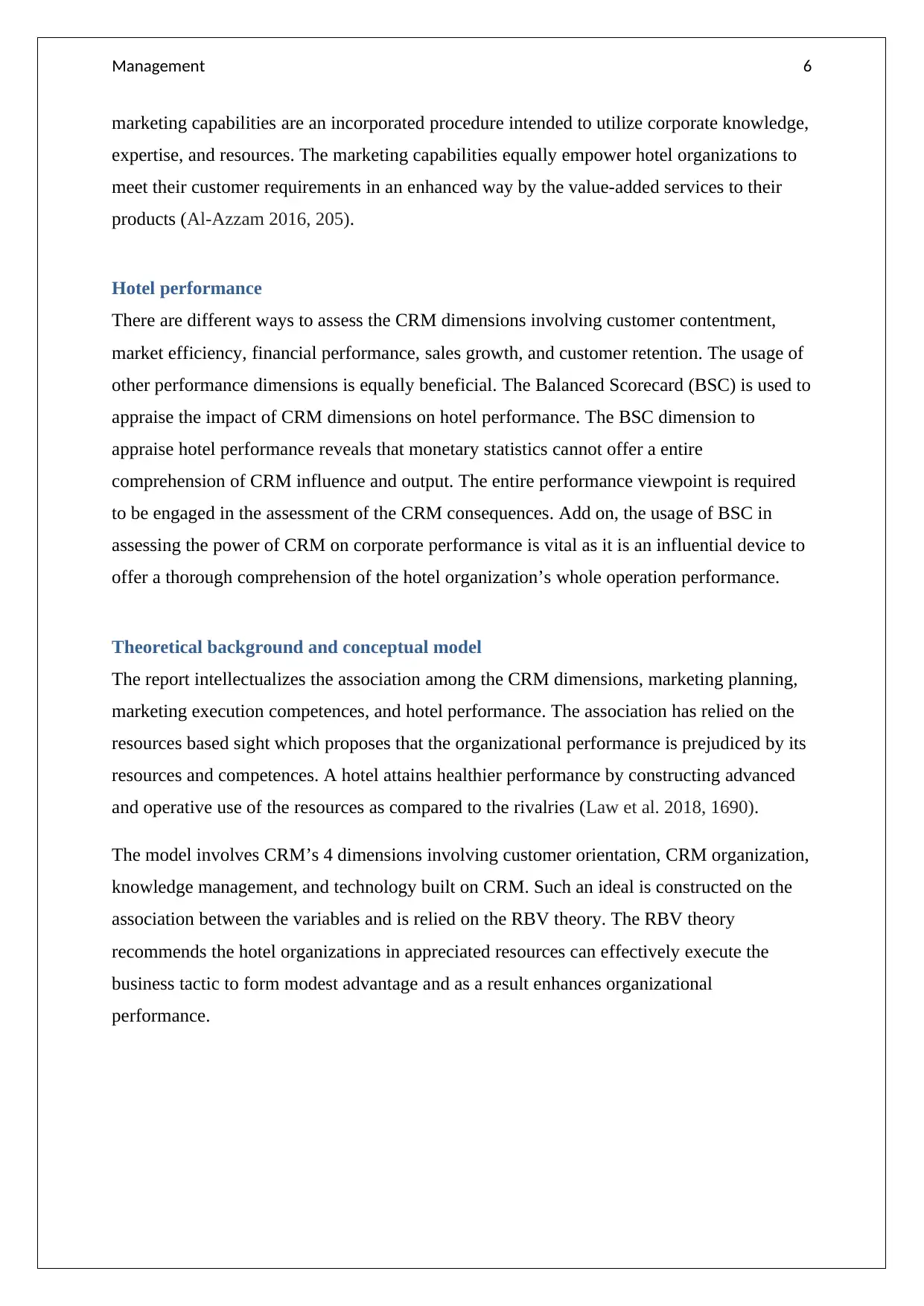
Management 6
marketing capabilities are an incorporated procedure intended to utilize corporate knowledge,
expertise, and resources. The marketing capabilities equally empower hotel organizations to
meet their customer requirements in an enhanced way by the value-added services to their
products (Al-Azzam 2016, 205).
Hotel performance
There are different ways to assess the CRM dimensions involving customer contentment,
market efficiency, financial performance, sales growth, and customer retention. The usage of
other performance dimensions is equally beneficial. The Balanced Scorecard (BSC) is used to
appraise the impact of CRM dimensions on hotel performance. The BSC dimension to
appraise hotel performance reveals that monetary statistics cannot offer a entire
comprehension of CRM influence and output. The entire performance viewpoint is required
to be engaged in the assessment of the CRM consequences. Add on, the usage of BSC in
assessing the power of CRM on corporate performance is vital as it is an influential device to
offer a thorough comprehension of the hotel organization’s whole operation performance.
Theoretical background and conceptual model
The report intellectualizes the association among the CRM dimensions, marketing planning,
marketing execution competences, and hotel performance. The association has relied on the
resources based sight which proposes that the organizational performance is prejudiced by its
resources and competences. A hotel attains healthier performance by constructing advanced
and operative use of the resources as compared to the rivalries (Law et al. 2018, 1690).
The model involves CRM’s 4 dimensions involving customer orientation, CRM organization,
knowledge management, and technology built on CRM. Such an ideal is constructed on the
association between the variables and is relied on the RBV theory. The RBV theory
recommends the hotel organizations in appreciated resources can effectively execute the
business tactic to form modest advantage and as a result enhances organizational
performance.
marketing capabilities are an incorporated procedure intended to utilize corporate knowledge,
expertise, and resources. The marketing capabilities equally empower hotel organizations to
meet their customer requirements in an enhanced way by the value-added services to their
products (Al-Azzam 2016, 205).
Hotel performance
There are different ways to assess the CRM dimensions involving customer contentment,
market efficiency, financial performance, sales growth, and customer retention. The usage of
other performance dimensions is equally beneficial. The Balanced Scorecard (BSC) is used to
appraise the impact of CRM dimensions on hotel performance. The BSC dimension to
appraise hotel performance reveals that monetary statistics cannot offer a entire
comprehension of CRM influence and output. The entire performance viewpoint is required
to be engaged in the assessment of the CRM consequences. Add on, the usage of BSC in
assessing the power of CRM on corporate performance is vital as it is an influential device to
offer a thorough comprehension of the hotel organization’s whole operation performance.
Theoretical background and conceptual model
The report intellectualizes the association among the CRM dimensions, marketing planning,
marketing execution competences, and hotel performance. The association has relied on the
resources based sight which proposes that the organizational performance is prejudiced by its
resources and competences. A hotel attains healthier performance by constructing advanced
and operative use of the resources as compared to the rivalries (Law et al. 2018, 1690).
The model involves CRM’s 4 dimensions involving customer orientation, CRM organization,
knowledge management, and technology built on CRM. Such an ideal is constructed on the
association between the variables and is relied on the RBV theory. The RBV theory
recommends the hotel organizations in appreciated resources can effectively execute the
business tactic to form modest advantage and as a result enhances organizational
performance.
Paraphrase This Document
Need a fresh take? Get an instant paraphrase of this document with our AI Paraphraser
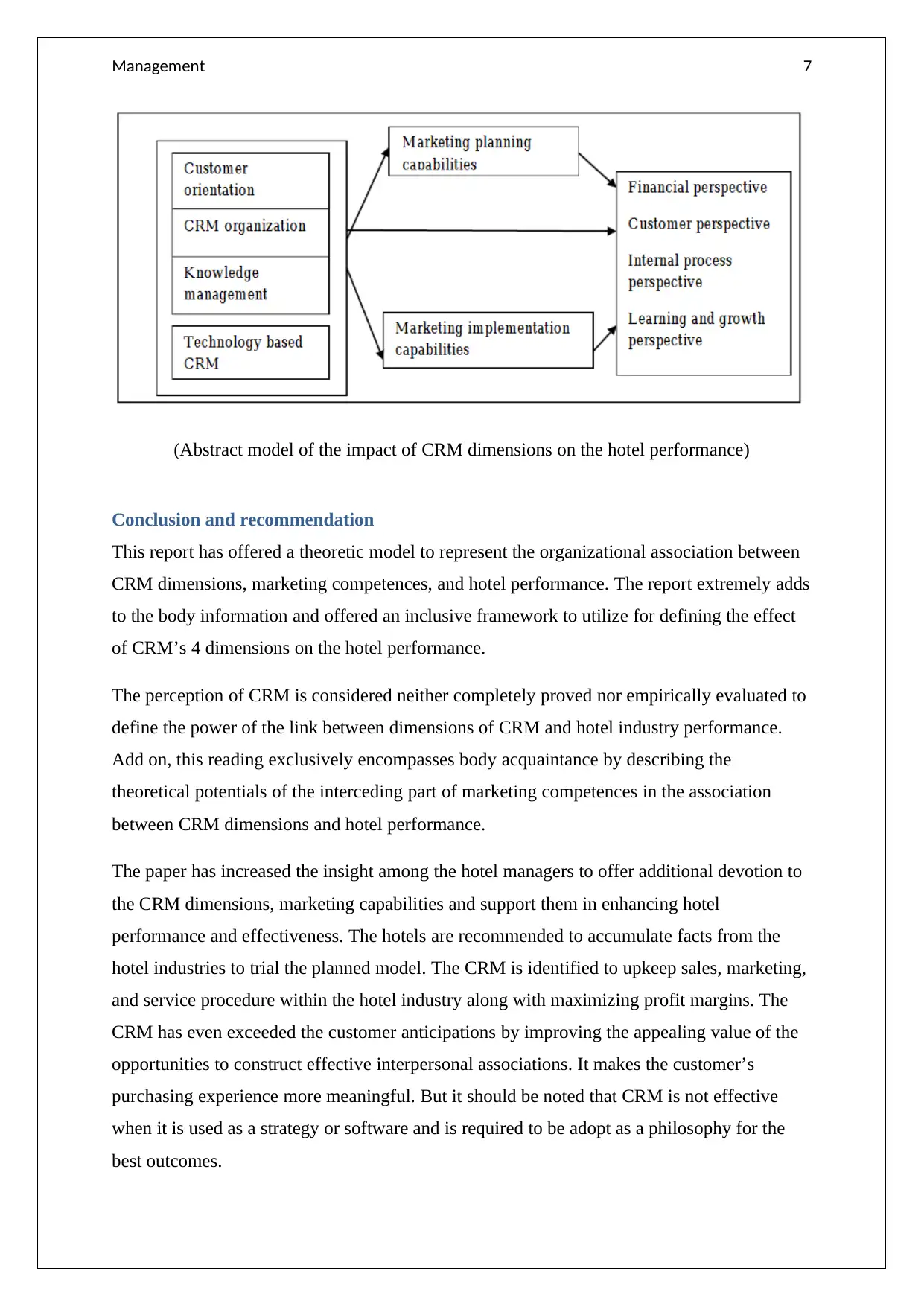
Management 7
(Abstract model of the impact of CRM dimensions on the hotel performance)
Conclusion and recommendation
This report has offered a theoretic model to represent the organizational association between
CRM dimensions, marketing competences, and hotel performance. The report extremely adds
to the body information and offered an inclusive framework to utilize for defining the effect
of CRM’s 4 dimensions on the hotel performance.
The perception of CRM is considered neither completely proved nor empirically evaluated to
define the power of the link between dimensions of CRM and hotel industry performance.
Add on, this reading exclusively encompasses body acquaintance by describing the
theoretical potentials of the interceding part of marketing competences in the association
between CRM dimensions and hotel performance.
The paper has increased the insight among the hotel managers to offer additional devotion to
the CRM dimensions, marketing capabilities and support them in enhancing hotel
performance and effectiveness. The hotels are recommended to accumulate facts from the
hotel industries to trial the planned model. The CRM is identified to upkeep sales, marketing,
and service procedure within the hotel industry along with maximizing profit margins. The
CRM has even exceeded the customer anticipations by improving the appealing value of the
opportunities to construct effective interpersonal associations. It makes the customer’s
purchasing experience more meaningful. But it should be noted that CRM is not effective
when it is used as a strategy or software and is required to be adopt as a philosophy for the
best outcomes.
(Abstract model of the impact of CRM dimensions on the hotel performance)
Conclusion and recommendation
This report has offered a theoretic model to represent the organizational association between
CRM dimensions, marketing competences, and hotel performance. The report extremely adds
to the body information and offered an inclusive framework to utilize for defining the effect
of CRM’s 4 dimensions on the hotel performance.
The perception of CRM is considered neither completely proved nor empirically evaluated to
define the power of the link between dimensions of CRM and hotel industry performance.
Add on, this reading exclusively encompasses body acquaintance by describing the
theoretical potentials of the interceding part of marketing competences in the association
between CRM dimensions and hotel performance.
The paper has increased the insight among the hotel managers to offer additional devotion to
the CRM dimensions, marketing capabilities and support them in enhancing hotel
performance and effectiveness. The hotels are recommended to accumulate facts from the
hotel industries to trial the planned model. The CRM is identified to upkeep sales, marketing,
and service procedure within the hotel industry along with maximizing profit margins. The
CRM has even exceeded the customer anticipations by improving the appealing value of the
opportunities to construct effective interpersonal associations. It makes the customer’s
purchasing experience more meaningful. But it should be noted that CRM is not effective
when it is used as a strategy or software and is required to be adopt as a philosophy for the
best outcomes.
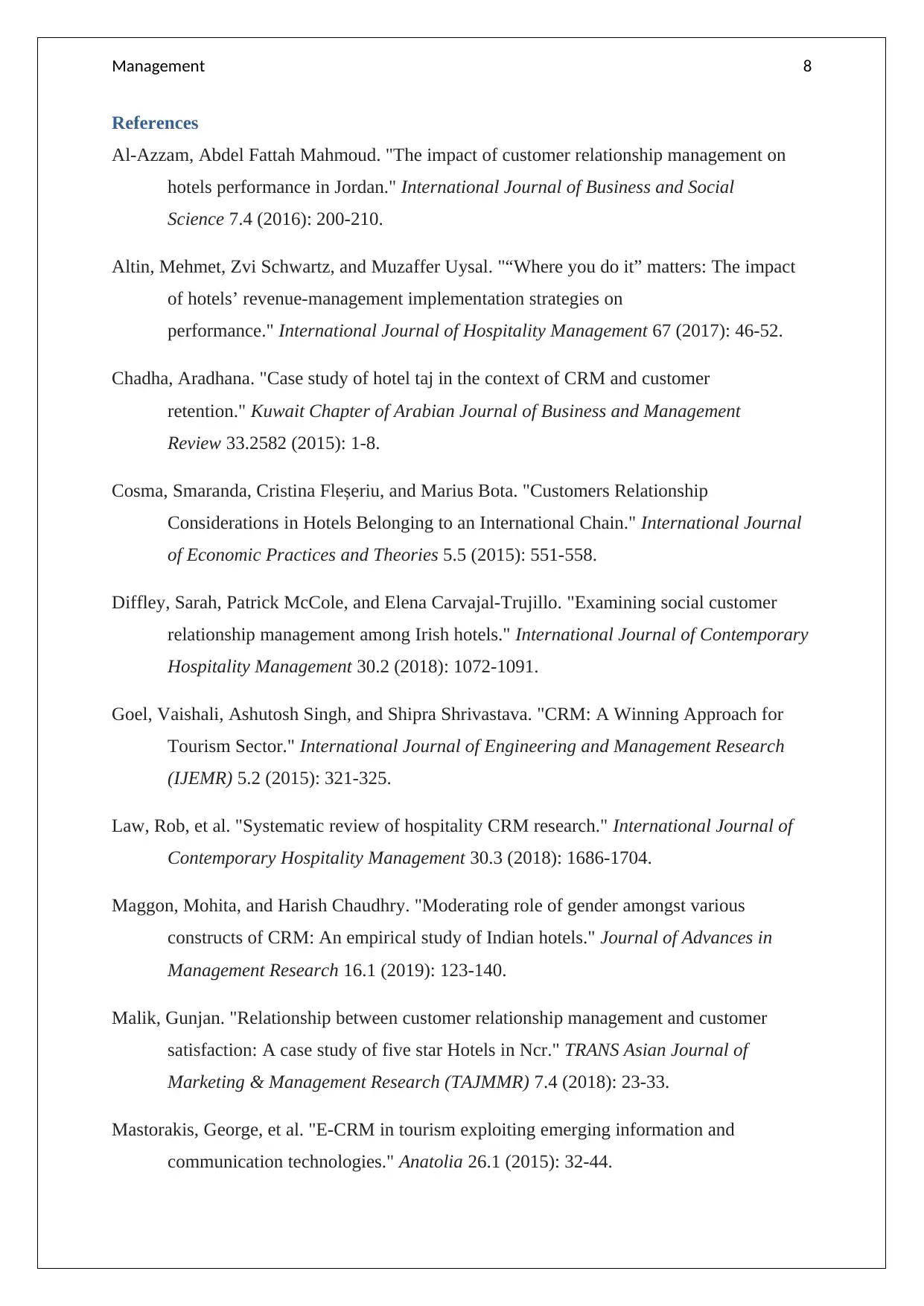
Management 8
References
Al-Azzam, Abdel Fattah Mahmoud. "The impact of customer relationship management on
hotels performance in Jordan." International Journal of Business and Social
Science 7.4 (2016): 200-210.
Altin, Mehmet, Zvi Schwartz, and Muzaffer Uysal. "“Where you do it” matters: The impact
of hotels’ revenue-management implementation strategies on
performance." International Journal of Hospitality Management 67 (2017): 46-52.
Chadha, Aradhana. "Case study of hotel taj in the context of CRM and customer
retention." Kuwait Chapter of Arabian Journal of Business and Management
Review 33.2582 (2015): 1-8.
Cosma, Smaranda, Cristina Fleșeriu, and Marius Bota. "Customers Relationship
Considerations in Hotels Belonging to an International Chain." International Journal
of Economic Practices and Theories 5.5 (2015): 551-558.
Diffley, Sarah, Patrick McCole, and Elena Carvajal-Trujillo. "Examining social customer
relationship management among Irish hotels." International Journal of Contemporary
Hospitality Management 30.2 (2018): 1072-1091.
Goel, Vaishali, Ashutosh Singh, and Shipra Shrivastava. "CRM: A Winning Approach for
Tourism Sector." International Journal of Engineering and Management Research
(IJEMR) 5.2 (2015): 321-325.
Law, Rob, et al. "Systematic review of hospitality CRM research." International Journal of
Contemporary Hospitality Management 30.3 (2018): 1686-1704.
Maggon, Mohita, and Harish Chaudhry. "Moderating role of gender amongst various
constructs of CRM: An empirical study of Indian hotels." Journal of Advances in
Management Research 16.1 (2019): 123-140.
Malik, Gunjan. "Relationship between customer relationship management and customer
satisfaction: A case study of five star Hotels in Ncr." TRANS Asian Journal of
Marketing & Management Research (TAJMMR) 7.4 (2018): 23-33.
Mastorakis, George, et al. "E-CRM in tourism exploiting emerging information and
communication technologies." Anatolia 26.1 (2015): 32-44.
References
Al-Azzam, Abdel Fattah Mahmoud. "The impact of customer relationship management on
hotels performance in Jordan." International Journal of Business and Social
Science 7.4 (2016): 200-210.
Altin, Mehmet, Zvi Schwartz, and Muzaffer Uysal. "“Where you do it” matters: The impact
of hotels’ revenue-management implementation strategies on
performance." International Journal of Hospitality Management 67 (2017): 46-52.
Chadha, Aradhana. "Case study of hotel taj in the context of CRM and customer
retention." Kuwait Chapter of Arabian Journal of Business and Management
Review 33.2582 (2015): 1-8.
Cosma, Smaranda, Cristina Fleșeriu, and Marius Bota. "Customers Relationship
Considerations in Hotels Belonging to an International Chain." International Journal
of Economic Practices and Theories 5.5 (2015): 551-558.
Diffley, Sarah, Patrick McCole, and Elena Carvajal-Trujillo. "Examining social customer
relationship management among Irish hotels." International Journal of Contemporary
Hospitality Management 30.2 (2018): 1072-1091.
Goel, Vaishali, Ashutosh Singh, and Shipra Shrivastava. "CRM: A Winning Approach for
Tourism Sector." International Journal of Engineering and Management Research
(IJEMR) 5.2 (2015): 321-325.
Law, Rob, et al. "Systematic review of hospitality CRM research." International Journal of
Contemporary Hospitality Management 30.3 (2018): 1686-1704.
Maggon, Mohita, and Harish Chaudhry. "Moderating role of gender amongst various
constructs of CRM: An empirical study of Indian hotels." Journal of Advances in
Management Research 16.1 (2019): 123-140.
Malik, Gunjan. "Relationship between customer relationship management and customer
satisfaction: A case study of five star Hotels in Ncr." TRANS Asian Journal of
Marketing & Management Research (TAJMMR) 7.4 (2018): 23-33.
Mastorakis, George, et al. "E-CRM in tourism exploiting emerging information and
communication technologies." Anatolia 26.1 (2015): 32-44.
⊘ This is a preview!⊘
Do you want full access?
Subscribe today to unlock all pages.

Trusted by 1+ million students worldwide
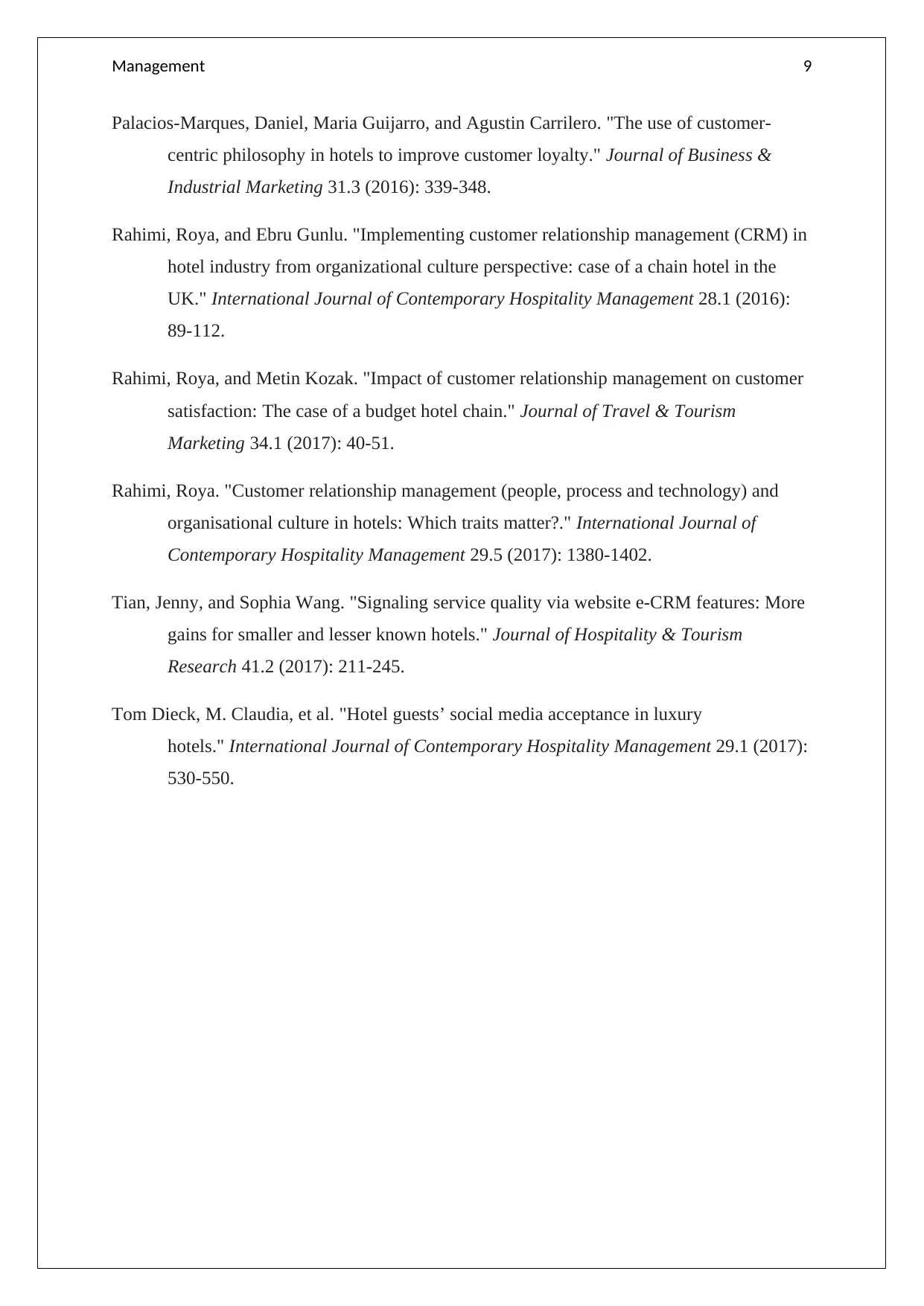
Management 9
Palacios-Marques, Daniel, Maria Guijarro, and Agustin Carrilero. "The use of customer-
centric philosophy in hotels to improve customer loyalty." Journal of Business &
Industrial Marketing 31.3 (2016): 339-348.
Rahimi, Roya, and Ebru Gunlu. "Implementing customer relationship management (CRM) in
hotel industry from organizational culture perspective: case of a chain hotel in the
UK." International Journal of Contemporary Hospitality Management 28.1 (2016):
89-112.
Rahimi, Roya, and Metin Kozak. "Impact of customer relationship management on customer
satisfaction: The case of a budget hotel chain." Journal of Travel & Tourism
Marketing 34.1 (2017): 40-51.
Rahimi, Roya. "Customer relationship management (people, process and technology) and
organisational culture in hotels: Which traits matter?." International Journal of
Contemporary Hospitality Management 29.5 (2017): 1380-1402.
Tian, Jenny, and Sophia Wang. "Signaling service quality via website e-CRM features: More
gains for smaller and lesser known hotels." Journal of Hospitality & Tourism
Research 41.2 (2017): 211-245.
Tom Dieck, M. Claudia, et al. "Hotel guests’ social media acceptance in luxury
hotels." International Journal of Contemporary Hospitality Management 29.1 (2017):
530-550.
Palacios-Marques, Daniel, Maria Guijarro, and Agustin Carrilero. "The use of customer-
centric philosophy in hotels to improve customer loyalty." Journal of Business &
Industrial Marketing 31.3 (2016): 339-348.
Rahimi, Roya, and Ebru Gunlu. "Implementing customer relationship management (CRM) in
hotel industry from organizational culture perspective: case of a chain hotel in the
UK." International Journal of Contemporary Hospitality Management 28.1 (2016):
89-112.
Rahimi, Roya, and Metin Kozak. "Impact of customer relationship management on customer
satisfaction: The case of a budget hotel chain." Journal of Travel & Tourism
Marketing 34.1 (2017): 40-51.
Rahimi, Roya. "Customer relationship management (people, process and technology) and
organisational culture in hotels: Which traits matter?." International Journal of
Contemporary Hospitality Management 29.5 (2017): 1380-1402.
Tian, Jenny, and Sophia Wang. "Signaling service quality via website e-CRM features: More
gains for smaller and lesser known hotels." Journal of Hospitality & Tourism
Research 41.2 (2017): 211-245.
Tom Dieck, M. Claudia, et al. "Hotel guests’ social media acceptance in luxury
hotels." International Journal of Contemporary Hospitality Management 29.1 (2017):
530-550.
1 out of 10
Related Documents
Your All-in-One AI-Powered Toolkit for Academic Success.
+13062052269
info@desklib.com
Available 24*7 on WhatsApp / Email
![[object Object]](/_next/static/media/star-bottom.7253800d.svg)
Unlock your academic potential
Copyright © 2020–2026 A2Z Services. All Rights Reserved. Developed and managed by ZUCOL.




